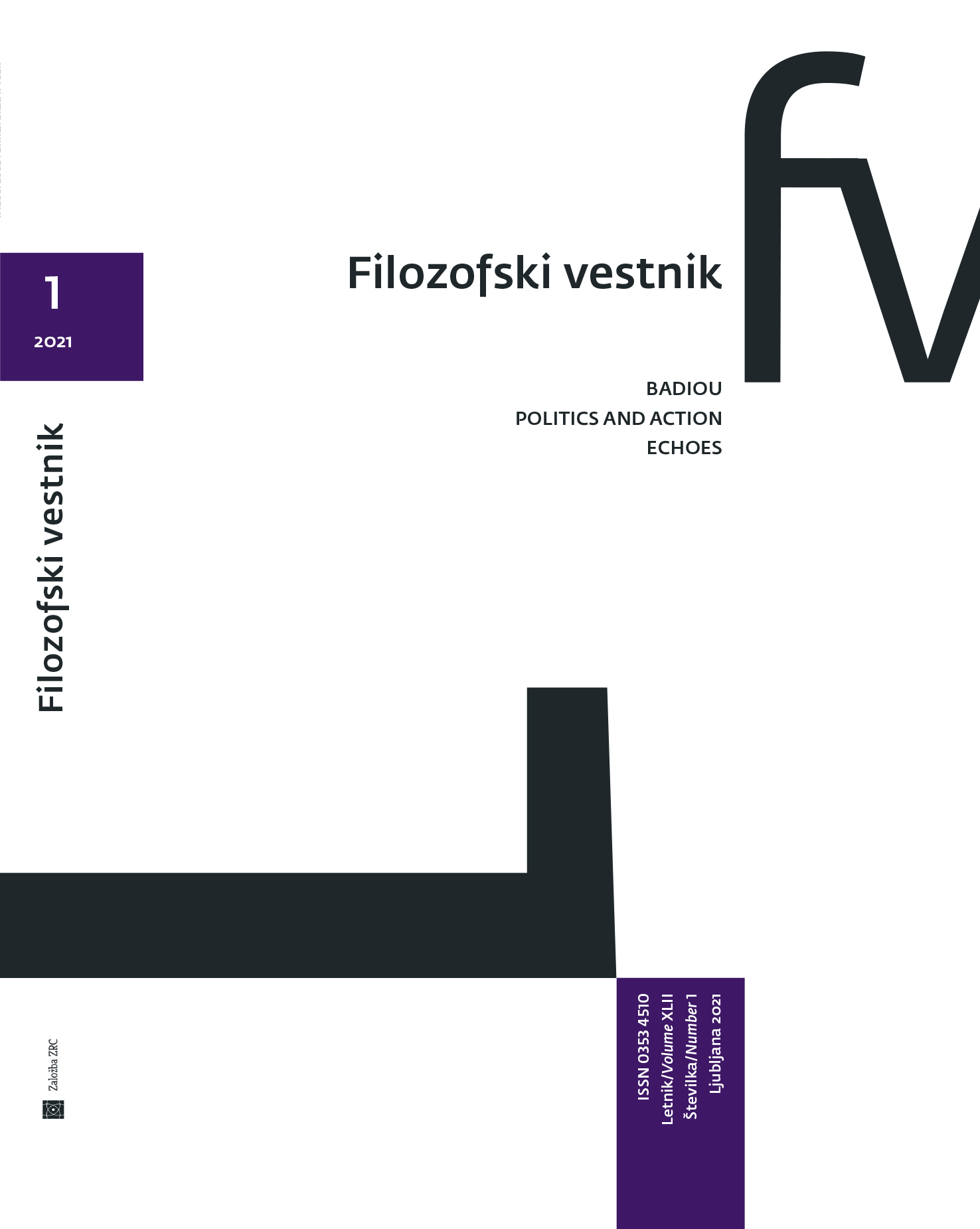Velikosti v Badioujevi objektivni fenomenologiji in teoriji potrošniške izbire
DOI:
https://doi.org/10.3986/fv.42.1.04Ključne besede:
Badiou, preferenčna logika, teorija koristnosti, objektivna fenomenologija, Marx, vrednostna formaPovzetek
Mladi Marx je nekoč pripomnil, da se je politična ekonomija znašla v odtujeni formi in terja kritičen premislek lastnega predmeta raziskovanja. Njegov predlog je šel v smer popolne razgraditve kategorij ekonomske objektivnosti, da bi se lahko dokopali do prave življenjske dejavnosti človeka. V pričujočem članku zavzemamo stališče, da se sodobna ekonomska teorija še naprej nahaja v takšni odtujitvi, čeprav se ponaša s subjektivistično revolucijo, ki je odpravila vezi s klasično politično ekonomijo. Marginalistično opiranje na »merljive« potrošniške preference ni zgolj utrdilo odtujitev te vede, neoklasična ekonomika je v nadaljevanju rekonceptualizirala tudi celotne temelje klasične ekonomije. Novo kritično ekonomsko mišljenje bo zato moralo odpraviti diskontinuiteto med klasiki in neoklasiki, če bo želelo ekonomsko vedo pripeljati iz te odtujitve. Za uspešen preboj bo najprej potrebovalo ustrezno močan konceptualni okvir, ki bo zmožen obravnavati kontinuiteto temeljnih kategorij. V članku zagovarjamo tezo, da objektivna fenomenologija Alaina Badiouja poseduje sinhrono strukturo, ki je zmožna zajeti ključne ekonomske zastavke in v analogiji omogoča komparativni in sintetični pristop. Takšno strukturo razumemo kot pogoj za nov način kritičnega mišljenja v ekonomski znanosti. Članek sklenemo s pogledom na Marxovo vrednostno formo kot možno osrednjo kategorijo v zastavitvi alternativnega ekonomskega okvira.
Prenosi
Literatura
Backhaus, Hans-Georg, “On the Dialectics of the Value-Form”, Thesis Eleven, 1 (1/1980), pp. 99–120.
Badiou, Alain, Logics of Worlds: Being and Event, 2, trans. A. Toscano, London, Continuum, 2009.
Badiou, Alain, Mathematics of the Transcendental, ed. and trans. A. J. Bartlett and A. Ling, London, Bloomsbury, 2014.
Behret, Hülya, “Group decision making with intuitionistic fuzzy preference relations”, Knowledge-Based Systems, 70 (2014), pp. 33–43.
Debreu, Gérard, Theory of Value an Axiomatic Analysis of Economic Equilibrium, New Haven, CT, Yale University Press 1971.
Goldblatt, Robert, Topoi: The Categorial Analysis of Logic, Mineola, NY, Dover Publications, 2006.
Heinrich, Michael, Die Wissenschaft vom Wert, Münster, Westfälisches Dampfboot, 2006.
Jevons, William S., The Theory of Political Economy, (5th ed.), New York, Augustus M. Kelley, [1871] 1965.
Kranjc, Uroš, “Logics of the Value Form – Marx with Badiou” Cosmos and History, 14 (3/2018), pp. 72–102.
Marcuse, Herbert, Reason and Revolution: Hegel and the Ruse of Social Theory, (2nd ed.), London, Routledge & Kegan Paul, 1955.
Marx, Karl, Economic and Philosophic Manuscripts of 1844 / and the Communist Manifesto, Karl Marx and Frederick Engels, Buffalo, NY, Prometheus Books, 1988.
Marx, Karl, Capital: A Critique of Political Economy, Volume One, London, Penguin books, 1993.
Wright, Georg H., “The Logic of Preference Reconsidered”, Theory and Decision, 3 (2/1972), pp. 140–163.
Prenosi
Objavljeno
Verzije
- 2022-04-05 (2)
- 2021-12-31 (1)
Kako citirati
Številka
Rubrike
Licenca
Avtorske pravice (c) 2021 Avtorji

To delo je licencirano pod Creative Commons Priznanje avtorstva-Nekomercialno-Brez predelav 4.0 mednarodno licenco.
Avtorji jamčijo, da je delo njihova avtorska stvaritev, da v njem niso kršene avtorske pravice tretjih oseb ali kake druge pravice. V primeru zahtevkov tretjih oseb se avtorji zavezujejo, da bodo varovali interese založnika ter da bodo povrnili morebitno škodo.
Podrobneje v rubriki: Prispevki





